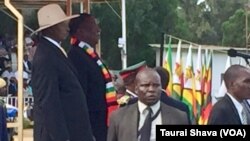Ugandan President Yoweri Museveni has joined the chorus of African leaders calling on the west to lift sanctions imposed on n some of Zimbabwe’s government and political leaders as well as entities.
Speaking at the official opening of the 60th Zimbabwe International Trade Fair (ZITF) in Bulawayo, where he was the guest of honor, Museveni applauded Zimbabwe for remaining, “steadfast in the face challenges.”
Museveni, who has been under international scrutiny for his longevity in power and the alleged suppression of political opponents, criticized the west, and said the idea of imposing sanctions as a form of punishment on individuals not abiding by their standards, was “cowardice.”
“I want to condemn the sanctions which have been put on Zimbabwe for such a long time,” Museveni said, referencing the close to two decades that Zimbabwe has been under sanctions from the United States, Britain and other countries in the European Union.
“The idea of sanctions is cowardice,” continued Museveni. “If somebody is wrong, leave him. He will fail by his own mistakes. Why do you have to put sanctions,” queried Museveni.
Echoing Museveni’s call that sanctions are ineffective, longtime journalist Tapfuma Machakaire said sanctions seem to have failed to achieve their intended objective, be it changing governments or ways government run their countries.
Machakaire said it’s time for western countries to seek alternative strategies to bring about the change they feel is needed.
“We’ve been under sanction many years, but the objectives of the sanctions don’t appear to have been met. If they are intended to remove a government or change the way country is being government we are not seeing that working,” said Machakaire.
He advised western countries to change tactics.
“If there’s something specific that the superpowers want see African governments or other countries do, they should find other ways to address those with the countries whose governing practices they don’t agree with,” said Machakaire.
However, a Bulawayo resident who wanted to be identified only as John, dismissed the argument that sanctions were responsible for a country’s economic backslide, blaming it instead on the governments themselves.
“I don’t believe its sanctions that are keeping the country behind,” said John. “We, on our own, our leaders are failing to what we should be doing. So as far as sanctions, the leaders unfortunately are the ones failing on their own,” John concluded.
Despite call from various leaders and groups for the U.S., Britain and EU to lift the sanctions on Zimbabwe, all have recently extended the sanctions for an additional year, pending the implementation and adoption of certain reforms including respect for human rights, rule of law and freedom of the press. They also argue the sanctions are targeted and not intended to hurt ordinary citizens.
Zimbabwe has argued that the sanctions, imposed during the leadership of former President Robert Mugabe, should now be revisited and removed, given that Mugabe is now out of office, and the government of President Emmerson Mnangagwa has implemented some of the conditional reforms for lifting sanctions, such as respecting property rights and commitment to amending oppressive media laws such as the Access to Information and Protection of Privacy Act, AIPPA.
Museveni encouraged Zimbabwe to continue tapping into its natural resources such as minerals and agriculture, to grow its economy.
The ZITF, which ran under the theme, Propagating Industrial Growth Through Trade and Investment, will wrap up on Saturday.





